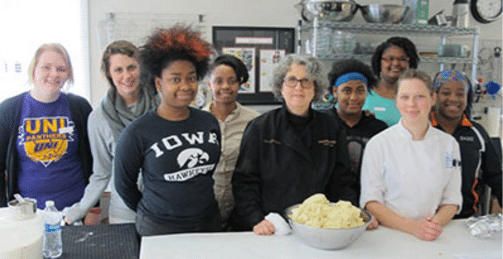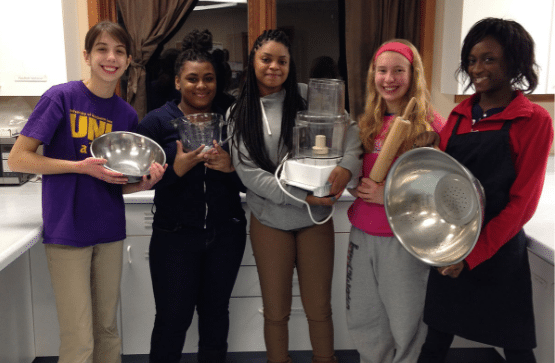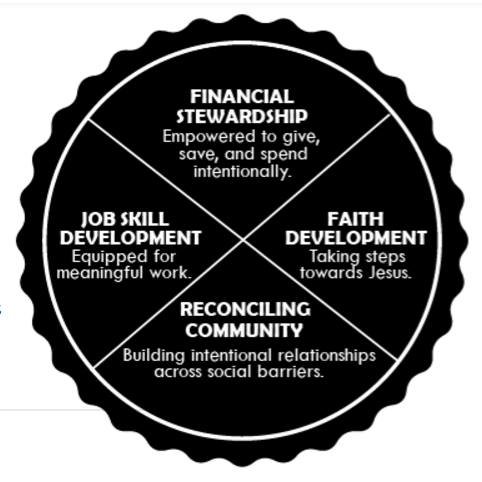
Photo from www.trypie.org
We are doing a summer blog series aimed at those who are either starting a missional enterprise or thinking about starting one. During this series, we will look at theological and practical concerns of missional entrepreneurs.
The third post in this series is written by Sarah Turner, co-director of Try Pie in the Cedar Valley of Iowa. Try Pie is a social enterprise that employs high school girls to make and sell pie as they are equipped with life and leadership skills.
Q: What was right for your context? How did you all figure out that A) working with teenage girls was a good fit for your ministry, B) that employment was the right way to reach them, and C) that baking would be a good fit for them as well? And, from your experience, is there anything you can distill or extrapolate that might be helpful for others looking at their own city/church/country and wanting to start a missional enterprise?
A: How did we know working with teenage girls would be a good fit for our ministry? Why did we choose employment? And why in the world did we choose to bake? Jesus. Jesus, for sure. I don’t say that as a cliche, I say that to put it simply. Every time we reflect on our starting story as a team, it continues to be clear that entering into a social enterprise youth ministry centered around a single baked good was a graciously guided process that would have no hope without the deep desire to know and love each other the way Jesus showed us in the first place. Start there, friends.
Photo by rawpixel.com on Unsplash
Here’s the journey SparkNotes version:
Sometimes before you’re nudged to do something new, you have to notice what—or who—you have and listen up.
The original Try Pie crew consisted of a group of girls we, our friends, and church family already had relationships with through a partnership between our church and another in Waterloo. This partnership provided programs, community events and activities that would later connect us with the first Try Pie employees as it set a foundation of personal relationships developed over time.

The original Try Pie team members, 2014
(photo from www.trypie.org)
It was through these relationships that we began to hear what our friends saw as assets of their neighborhood, as well as their hopes and expectations for the future. A few of the requests that stuck out in these conversations were desires for 1) ways to earn income and 2) productive things for youth to do while not in school. Because we had started to listen and spend time there, we realized these specific requests as apparent desires of the broader community. The city’s teen unemployment rate has stood at almost twice the national average, and various forms of disparity has left evidence of tensions, barriers, and untapped potential in the form of generational poverty, high overall unemployment rates and racial isolation.
We began to hear and see these issues through the eyes of our friends, and grow confidence in research saying employment for teens could decrease involvement in crime and increase their likelihood to graduate high school, attend college and retain higher earnings in their future. These were the learnings that would later give clarity and focus to our program’s values and offerings in areas of Job Skill Development, Financial Stewardship, Faith Development and Reconciling Community.

Photo by Alexis Brown on Unsplash
Looking back, it’s humbling to realize how God guided this process to illustrate the importance of listening, questioning, learning, and responding with those we seek to serve leading the way.
Each choice along the way—focusing on teenage girls, choosing employment as the tool and baking as the method—was only made after time spent in prayer and relationship. If God gives you the chance, give the people what they want—just become a friend who asks first.
In the midst of these findings and conversations, a youth soccer program had connected a handful of teenage girls with adults from our church. From there it was natural to bring together a few of these young women to brainstorm what type of business they’d like to see started, and what kind of work they’d like to do. Continued conversations with the teens, friends, and local business leaders, and a little bit of research, brought us to something unexpected: pie.
The idea really did almost “just come together,” and sometimes you have to prayerfully, humbly, gather up some hopeful expectation and roll with it.

Photo from www.trypie.org
For us, an employment program hasn’t been the goal from the beginning, but has turned out to be an incredible tool in engaging with teens on a deeper level.
I’m not sure exactly how to give advice to someone hoping to start a missional or social enterprise, but there are some practical pieces of starting a social enterprise that could have been helpful to know up front.
Know your context, and walk alongside someone who knows it better than you do. So much of your approach will depend on the context of where God’s put you. There’s validity to asking for discernment for how God’s wired you—your passions, your resources, your skills. There’s equal, maybe sometimes even more, importance in asking whomever you feel nudged to know and serve what they see and desire and have to contribute. Choosing to learn from those we might feel led to lead keeps us humble and grounded in the reality we’re continually seeking to understand.
Partner with a church if you can. I wholeheartedly believe that God is blessing the overlap between business and ministry, and am being continually convinced that God is pulling the Church into this space for His glory and our good. I’m equally sure that it’s hard to do that well. Try Pie being a program of our local church has been an incredible catalyst for our growth and stability. The Church is equipped with a body able to answer questions on anything from payroll and tax forms to keeping faith as a foundation.

Graphic from www.trypie.org
It’s no secret that upcoming generations are looking for the Church to go beyond its walls and respond to issues of division and injustice and brokenness.
A social enterprise starts to tackle this call as it offers the Church a chance to be involved in the community holistically, addressing a wide spectrum of needs while engaging the assets that are already there. Being present in the community gives us a chance to experience both brokenness and hope alongside each other, and puts us in the critical position of listening, learning, and growing as a community of friends.
Hungry for more? Sign up for our newsletter and stay up to date on our latest blogs and Ministry Incubators news!





0 Comments